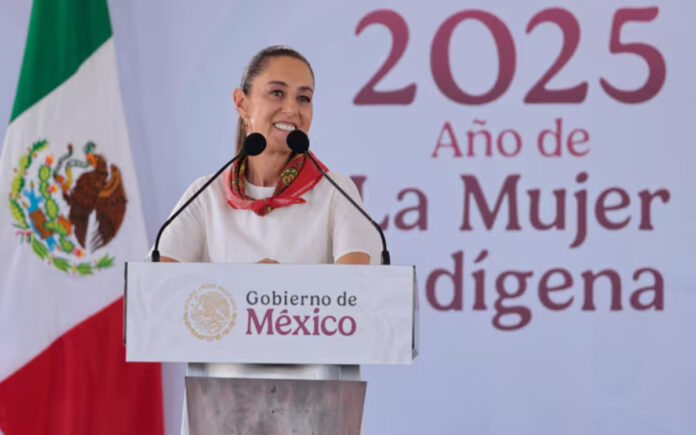Texcoco, Mexico: Mexican President Claudia Sheinbaum has firmly rejected a proposal from U.S. President Donald Trump to send American troops into Mexico to combat drug trafficking, underscoring her unwavering stance on national sovereignty.
Speaking during a university event near the capital, Sheinbaum addressed the recent Wall Street Journal report that revealed Trump’s push for deeper U.S. military involvement in Mexico’s efforts to curb cross-border drug smuggling. The May 2 report claimed Trump had increased pressure on Mexico to allow more direct U.S. action against powerful drug cartels operating near the shared border.
“In one of the calls, (Trump) said, ‘How can we help you fight drug trafficking? I propose that the U.S. Army come in to help you,'” Sheinbaum recounted. “And you know what I told him? No, President Trump, the territory is sacrosanct, sovereignty is sacrosanct, sovereignty is not for sale, sovereignty is loved and defended.”
Sheinbaum emphasized that Mexico is open to bilateral cooperation on issues such as drug trafficking, trade, and immigration—but without compromising its territorial integrity. “We will never accept the presence of the United States military in our territory,” she stated.
In response to a Reuters inquiry, a spokesperson for the U.S. National Security Council said Trump had made it “crystal clear that Mexico must do more to combat these gangs and cartels,” while affirming that the U.S. “stands ready to assist and expand the already close cooperation between our two countries.” The spokesperson further noted that Trump had worked closely with Sheinbaum to ensure what they described as “the most secure southwest border in history.”
Still, the NSC reiterated concerns that “dangerous foreign terrorist organizations continue to threaten our shared security and the drugs and crime they spread threaten American communities across the country.” The White House has not officially confirmed whether Trump explicitly raised troop deployment in any call with Sheinbaum.
Trump has made no secret of his belief that the U.S. should act unilaterally if Mexico is unable to dismantle drug cartels, and the two leaders have reportedly spoken multiple times in recent months to address key regional issues.
Sheinbaum noted that during one of their phone calls, she asked Trump for assistance in stopping the flow of weapons from the U.S. into Mexico, which has long fueled cartel violence. “We can collaborate, we can work together, but you can do it in your territory, we can do it in ours,” she said.
The Wall Street Journal report also highlighted that tensions flared toward the end of an April 16 call, when Trump urged Sheinbaum to allow a more prominent U.S. military role in targeting Mexican cartels—particularly those involved in fentanyl trafficking into the United States.
Also Read | France Eyes National Vote on Budget as Public Sector Fears Rise
In February, the U.S. formally designated the Sinaloa Cartel and other Mexican criminal organizations as global terrorist entities, a move that some analysts warn could lay the groundwork for future military action. American aerial surveillance targeting cartel operations inside Mexico has also expanded in recent months to bolster intelligence gathering.
As a response to rising concerns over foreign interference, Sheinbaum has since proposed a constitutional reform aimed at reinforcing protections around Mexico’s national sovereignty.



